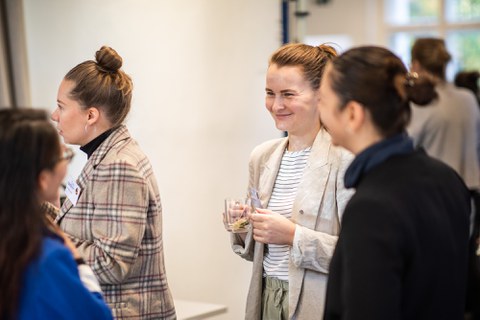Feb 28, 2025
Energy in focus: 10,000 euros in funding for science communication project goes to TUD researcher Katharina Hunger

Katharina Hunger in dialogue.
Federal Ministry of Education and Research (BMBF) and "Wissenschaft im Dialog" (WiD) award ten winners
We need energy in almost all areas of everyday life. However, climate change and limited resources present us with major challenges: How should we talk about the topic of energy in order to bring as many people as possible on board? Conflicts over the provision of alternative energy sources are also shaping the discussion for the Lusatia region undergoing structural change.
This is why Katharina Hunger (Research Associate at the CIMTT Center of Production Engineering and Management at TU Dresden) developed her project Zukunftswerkstatt Lausitz 2050 - Energie im Fokus for the university competition as part of the Science Year 2025 - Future Energy . The BMBF and WiD selected her as one of the ten winners from almost 120 submissions - her project will be funded with EUR 10,000 to be implemented by the end of the year.
Interactive simulation game on the energy transition
In the Future Workshop Lusatia 2050 - Focus on Energy, researchers, citizens and entrepreneurs discuss challenges in the Lusatia region undergoing structural change. Participants take on the role of decision-makers in interactive workshops and develop visions for a sustainable energy landscape in 2050. "The Future Workshop provides a central platform for citizens to contribute their needs, concerns and expectations directly to the process of shaping the energy transition," explains Hunger. Based on the tasks of the Reference Power Plant Lusatia project(www.RefLau.com)- a new type of power plant concept - the stakeholders simulate conflicting objectives and design innovative approaches that take into account current economic and legal framework conditions.
The future workshop is participatory, creative and solution-oriented. It begins with the critique phase, in which participants identify and analyze problems. This is followed by the vision phase, in which utopias and ideas for solutions are developed with the help of role-playing games and visual techniques. In the realization phase, concrete implementation plans are developed. The future workshop alternates between Dock3 (Lusatia) and the Cosmo Science Forum (Dresden) in order to incorporate urban and rural perspectives from Saxony and Brandenburg.
Scientific impact and social outreach
As a research partner with innovative strength and regional proximity, TU Dresden guarantees practical implementation opportunities. In exchange with economic stakeholders and researchers at TU Dresden - such as Dr.-Ing. Simon Unz (Research Group Leader "Energy Process Engineering and Heat Transfer" at the Chair of Energy Process Engineering) - scientific and technical possibilities are reflected and supplemented by the perspectives of society. "This collaboration is essential in order to develop solutions that are not only technically and economically feasible, but also socially accepted and sustainable in the long term," adds Hunger, who is doing her doctorate on the subject of transdisciplinary research in the engineering sciences.
As part of the project, the Instagram account @wissenschaftimdialog provides information about the progress of the project in posts, reels and stories. In addition, the participation concept will be scientifically evaluated in order to investigate the cooperation between science, business and society and to successfully shape social change in the long term.
Background information:
University Competition 2025
The university competition is organized annually by Wissenschaft im Dialog (WiD ) in cooperation with the Federal Association of University Communication, the German Rectors' Conference and, as of this year, the Junge Akademie, and is funded by the Federal Ministry of Education and Research as part of the Year of Science.
The award-winning communication ideas revolve thematically around forms of renewable energy, complex energy policy decisions and artistic perspectives on sustainable energy systems. The teams use different communication formats - from an exhibition to an escape room game to an inclusive play. The ten successful teams are spread across the whole of Germany.
To accompany the project implementation, they attend training courses and events organized by Wissenschaft im Dialog, including on science communication and public relations, social media, storytelling and event organization. www.hochschulwettbewerb.net/2025/
Science Year 2025 - Energy of the future
The Science Year 2025 is dedicated to the topic of future energy. What could an energy mix look like that is clean, reliable, affordable and conserves resources? What technologies have already been developed and what is currently being researched? What new energy partnerships does our country need? What will the energy supply of the future look like - and what impact will it have on society? The importance of research for achieving a climate-neutral energy supply in the economy and society is the focus of the Science Year 2025. Energy research is an interdisciplinary, multi-layered, capital-intensive and strategic task. Climate change, limited resources and a simultaneously increasing global demand for energy present governments, industry and citizens with new challenges that research is addressing. The Science Year 2025 - Future Energy invites you to gain insights into solution strategies from energy research, learn about the latest innovations and findings and engage in an exchange with science, politics, business and society. The Year of Science is an initiative of the Federal Ministry of Education and Research (BMBF) together with Wissenschaft im Dialog (WiD). www.wissenschaftsjahr.de/2025
Science in Dialogue (WiD)
Wissenschaft im Dialog (WiD) is the central science organization for science communication in Germany. The non-profit organization is committed to an open society that shapes change with knowledge. To this end, it promotes a productive dialog between science and the public: As a think-and-do tank for science communication, WiD develops practice-relevant knowledge, offers target group-oriented training and further education, networks different stakeholders and develops innovative communication formats. Wissenschaft im Dialog was founded in 2000 by the most important German science organizations. www.wissenschaft-im-dialog.de
Contact person:
Katharina Hunger
CIMTT Center for Production Technology
+49 351 463-33597
